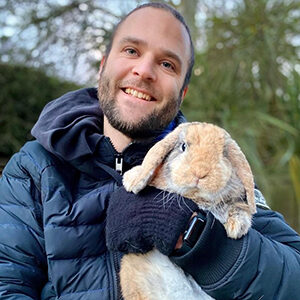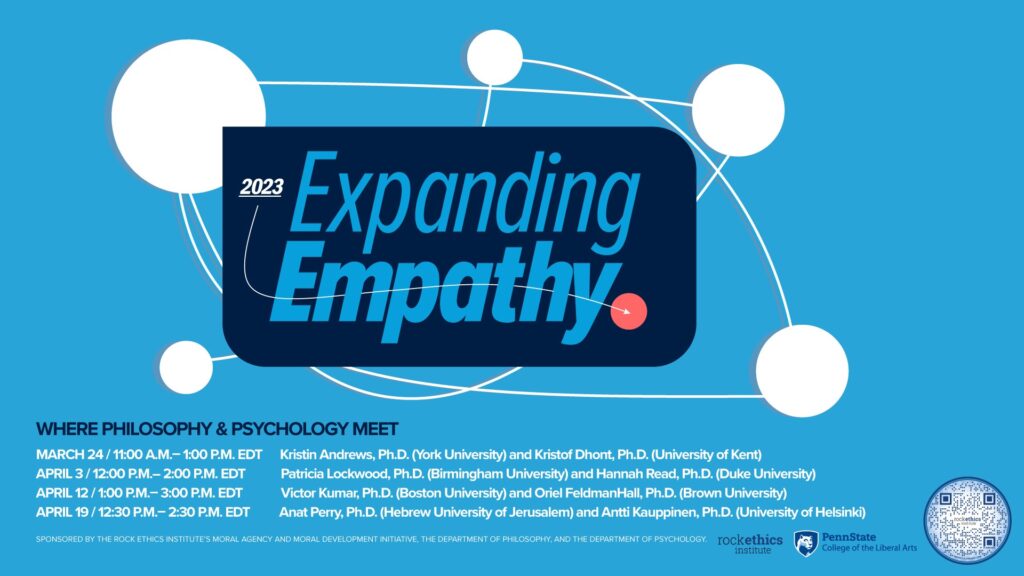Expanding Empathy Speaker Series: Empathy for Animals

Kristin Andrews, Ph.D. helped to establish the philosophy of animal minds and brings empirical and theoretical expertise to questions about the similarities and differences between humans and nonhuman animals in terms of their cognitive, affective, social, and cultural capacities. Her current research program has raised awareness of the existence of social norms in nonhuman animal communities, and illuminates how these norms can help to support conservation and welfare goals. She is York Research Chair in Animal Minds and Professor of Philosophy at York University and was elected to the College of the Royal Society of Canada in 2015.
LECTURE TITLE: “Empathy for Animal Communities”
ABSTRACT: The growing recognition that other animals, like humans, are cultural beings invites us to empathize with them in a new way. For example, some cultural capacities and practices important to captive animals may be impeded or disrupted intentionally because they appear “abnormal” or threaten health or unintentionally because they are not noticed. Likewise, seeing wild animals as cultural with their own social norms invites a new way to engage with them, as communities with cultural heritage. Broadening our empathy for other animals beyond considering their physical health and functioning, affective state, and “natural” behaviors to include something like cultural autonomy has significant ramifications for animal welfare and conservation policy. It also raises the question of preserving diverse animal cultures and respecting animal cultural heritage, including recognizing the significant differences between captive and wild animal cultures.

Kristof Dhont ,Ph.D., is a Reader in Psychology at the University of Kent (UK). He is founder and director of SHARKLab and co-founder and president of the PHAIR Society, both dedicated to the psychological study of human-animal relations. He investigates the psychological underpinnings and ideological roots of speciesism, racism, and sexism, and the moral psychology of eating and exploiting animals. He has co-edited Why We Love and Exploit Animals: Bridging Insights from Academia and Advocacy (Dhont & Hodson, 2020) and currently serves as Associate Editor for the journal Psychology of Human-Animal Intergroup Relations (PHAIR). Previously, he served as Associate Editor for Group Processes & Intergroup Relations (GPIR) and as Consulting Editor for the European Journal of Personality (EJP). He is a fellow of the Society of Experimental Social Psychology (SESP).
LECTURE TITLE: Loving and Exploiting Animals: The Ideological and Cultural Underpinnings of Speciesism
ABSTRACT: Despite being animals, humans distance themselves physically and mentally from (most) other animals and prioritize human interests. We exploit other animals to feed, clothe, and entertain ourselves, to name just a few animal exploitation practices. At the same time, most people also consider harming animals as morally troublesome, and are empathetic toward some animals. Such discrimination between and against other species, or speciesism, is the central focus of the presentation. Drawing on recent scientific findings, I address the psychological connections between speciesism and prejudices such as racism and sexism. Our findings show that those who support animal exploitation also tend to endorse sexist and racist views and rely on the belief in group dominance and human supremacy to justify systems of inequality and oppression. Furthermore, I will present new research with cross-cultural data showing that in addition to group-dominance motives, desires for maintaining cultural stability, order and social conformity can be a powerful ideological motive to defend cultural practices of animal exploitation.
